DHAKA, Sept. 29 -- It is a truism that youth is catalyst of development and social change. It is also a truism that the best way to solve poverty is through education.
And these are precisely the philosophies behind the three Bangladesh private university students who have been providing free basic education to the underprivileged children of capital Dhaka.
The youths of Dhaka's leading Eastern University offer children in slum with basic math and literacy skills, as well as Basic English classes.
Like many they also believe that getting education is the only way for children living in poverty-ridden areas in Bangladesh to realize their dreams of having a better life in the future.
Keeping these in mind, the youths have also recently set up "A Free School (AFS)", a child education development center, for further expansion of their activities throughout the South Asian country where there are estimated 400,000 street children with over a third of them settled in the capital city.
For running educational activities, AFS has initially chosen a slum beside the railway tracks next to Dhaka's Karwan Bazaar, one of the major commercial hubs of the city, where most of the slum dwellers are directly or indirectly involved in illegal drug business.
In an interview with Xinhua recently, Rezwan Ahmed Rozeal, one of the founders of AFS, said that the mission of the AFS is to change the lives of street children through literacy.
"We want to change their life through education," said Rozeal
He said scores of children of mostly floating people are getting free education from AFS.
Rozeal said that the underprivileged children have grasped the importance of education. They realized that without education they could not change their life. Education would be a tool to achieve their citizen rights and make them responsible to their duties to the state.
Sumaiya, one of the female students, said that she wants to become a doctor. "I am amazed of her dream. She proves that human beings are as big as their dreams," said Rozeal.
"I like to study. And I want to become a doctor," eight-year old Sumaiya Akhter told Xinhua.
Akhter's dim dream has been illuminated with the light of education as she started to learn Bangla and English alphabets from ASF.
"We're teaching them how to write, read and draw," Rozeal said.
Rozeal said that most of the children's parents are drug dealers, which make their efforts difficult. Most of the parents don't want their children to go to school.
But the optimistic dreamer youths never ready to admit defeat in their efforts.
Rozeal along with his two co-founder friends -- Touhid Islam and Morshed Alam Kawshik -- managed many guardians to send their children to school.
"I've seen a good change in them (guardians). There is a big change in their mentality. We want to keep this change in them," Rozeal said.
This poverty-ridden silent group faces various challenges in their social life, according to Rozeal.
"I don't think that they will remain underprivileged in their entire life. They have some extra ordinary talents too," said optimist Rozeal.
The school runs on minimum logistics and facilities, and lacks any kind of protection from adverse weather in the rainy and winter seasons.
AFS is now serving free education with materials including free books and other study materials from their own pocket money which they get from parents and by teaching children of rich families privately.
"We have no financial support. We spend money for AFS from the savings of our pocket money," Rozeal said.
Although their efforts seem to be insignificant compared to the awesome problem of homeless children in streets of Dhaka, they are undeterred in pursuing their dreams of expanding the operation of their center so that it can accommodate more deprived children who have not been given enough attention in a country with about 153 million people.
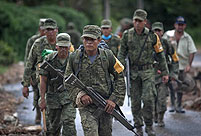 Storms leave 97 dead, 58 missing in Mexico
Storms leave 97 dead, 58 missing in Mexico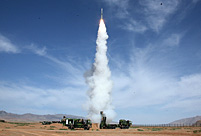 New model of indigenous surface-to-air missiles testfired
New model of indigenous surface-to-air missiles testfired  118.28-carat diamond to be auctioned in HK
118.28-carat diamond to be auctioned in HK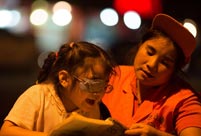 Maternal love under streetlight
Maternal love under streetlight Naked foreign student sits in the middle of a road in Haikou
Naked foreign student sits in the middle of a road in Haikou  Colorful Yunnan: Enjoy the natural beauty
Colorful Yunnan: Enjoy the natural beauty Harbin named Chinese city with most beautiful women
Harbin named Chinese city with most beautiful women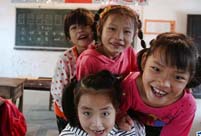 For last four students, teacher couple sticks to post on island
For last four students, teacher couple sticks to post on island 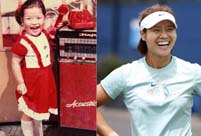 When big sport stars were kids
When big sport stars were kids PLA's 38th Group Army conduct training
PLA's 38th Group Army conduct training Residences of the royal house of Savoy
Residences of the royal house of Savoy The last days of Wan Aihua
The last days of Wan Aihua Highlights at 12th National Games of China
Highlights at 12th National Games of China Beijing Film Academy welcomes freshmen
Beijing Film Academy welcomes freshmen Large mahjong party sets new world record
Large mahjong party sets new world recordDay|Week|Month